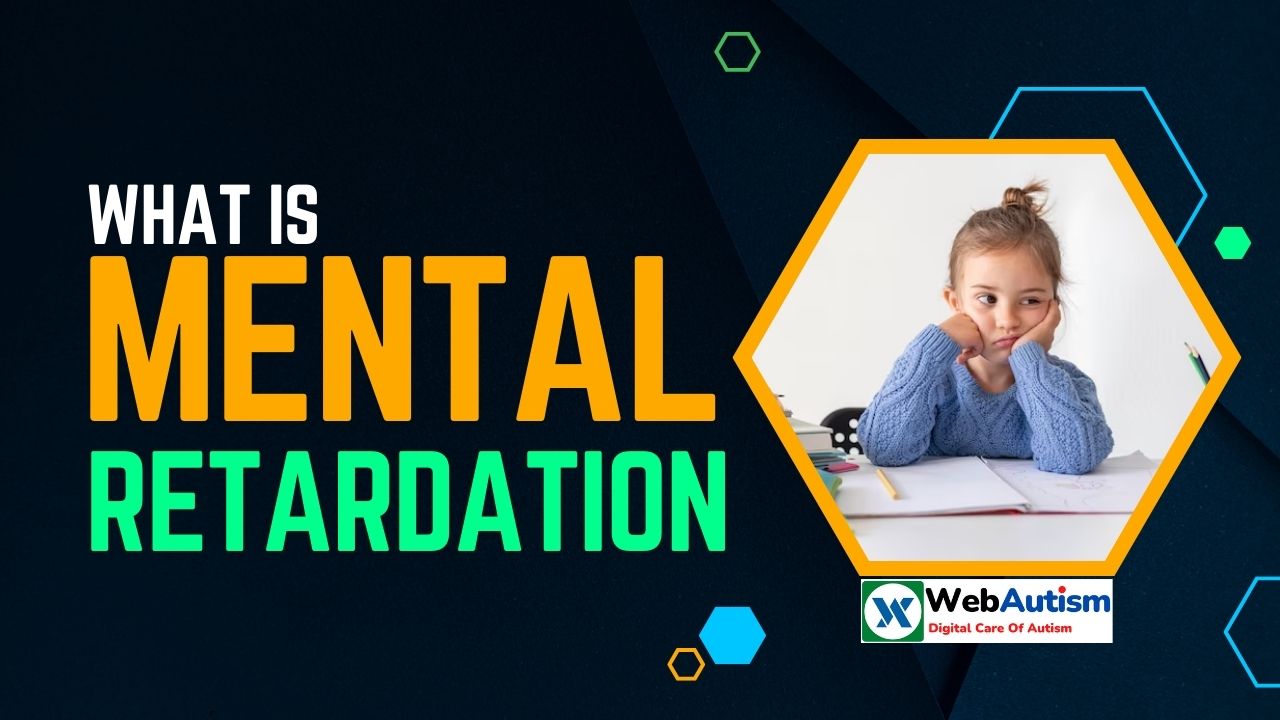Mental retardation, also known as intellectual disability (ID), is a condition characterized by limitations in intellectual functioning and adaptive behaviors. This lifelong condition affects an individual’s cognitive abilities, impacting their learning, communication, social skills, and daily life. In this article, we’ll delve into what mental retardation entails, its causes, associated symptoms, and the support available for individuals and their families.
Defining what is Mental Retardation (Intellectual Disability):
Mental retardation, or intellectual disability (ID), is a neurodevelopmental disorder that manifests during childhood and persists throughout an individual’s life. It is defined by significant limitations in both intellectual functioning and adaptive behaviors. Intellectual functioning encompasses reasoning, problem-solving, and learning abilities, typically measured by IQ (intelligence quotient) tests. Adaptive behaviors include practical and social skills necessary for everyday life.
Causes of Mental Retardation:
Understanding the various causes of intellectual disabilities involves a range of factors that can affect brain development and functioning. These causes can broadly be categorized into genetic, prenatal, perinatal, and postnatal factors:

1. Genetic Factors:
- Chromosomal Abnormalities: Certain genetic conditions result from abnormalities in chromosomes. For instance, conditions like Down syndrome (trisomy 21), Fragile X syndrome, Turner syndrome, and other genetic disorders can lead to intellectual disabilities.
- Single-Gene Mutations: Some rare genetic disorders caused by mutations in a single gene can affect brain development and result in intellectual disabilities. Conditions like Phenylketonuria (PKU), Tay-Sachs disease, and Rett syndrome are examples.
2. Prenatal Factors:
- Maternal Health Issues: Maternal health during pregnancy plays a crucial role in fetal development. Infections (such as rubella, cytomegalovirus, or toxoplasmosis), untreated maternal phenylketonuria (PKU), poorly controlled diabetes, or exposure to toxins, drugs, or alcohol during pregnancy can impact the developing fetus, leading to intellectual disabilities.
- Prenatal Brain Development: Any disruption or abnormality during fetal brain development can result in intellectual disabilities. This can include issues like insufficient oxygen supply to the fetus, brain malformations, or structural abnormalities in the brain.
3. Perinatal Factors:
- Complications During Birth: Birth-related issues, such as premature birth, low birth weight, prolonged labor, or birth injuries, can increase the risk of intellectual disabilities.
- Hypoxia or Lack of Oxygen: Oxygen deprivation to the baby’s brain during birth due to complications like umbilical cord problems or placental issues can lead to brain damage and subsequent intellectual disabilities.
4. Postnatal Factors:
- Infections and Illnesses: Serious infections affecting the brain, such as meningitis or encephalitis, or severe head injuries after birth, can cause intellectual disabilities.
- Environmental Factors: Exposure to environmental toxins, lead poisoning, severe malnutrition, or ongoing neglect and deprivation of care during early childhood can impact brain development and cognitive functioning.
5. Unexplained Causes:
In some cases, the cause of intellectual disabilities might not be clearly identifiable. It could be a combination of factors or certain conditions that have yet to be understood fully by medical science.
It’s essential to recognize that intellectual disabilities can result from complex interactions between genetic and environmental factors. Additionally, the severity and specific symptoms of intellectual disabilities can vary widely among individuals, even when the underlying causes might be similar.
Symptoms of Mental Retardation:
The symptoms and severity of mental retardation can vary widely among individuals. Some common signs and symptoms include:

Intellectual Functioning:
- Learning difficulties: Individuals may have trouble understanding complex or abstract information.
- Delayed milestones: Delays in reaching developmental milestones, such as sitting up, crawling, walking, or speaking, compared to peers.
- Problem-solving challenges: Difficulty in solving problems, thinking logically, or understanding cause-and-effect relationships.
Communication Challenges:
- Language difficulties: Delayed speech development, limited vocabulary, or challenges in understanding and using language.
- Non-verbal communication: Difficulty understanding gestures, facial expressions, or body language.
Social and Emotional Aspects:
- Social interactions: Challenges in forming and maintaining relationships, understanding social cues, or engaging in appropriate social behavior.
- Emotional regulation: Difficulty expressing emotions, managing feelings, or understanding others’ emotions.
Adaptive Behaviors:
- Daily living skills: Difficulties in managing daily tasks independently, such as personal hygiene, dressing, and eating.
- Safety and self-care: May require supervision and assistance in navigating potentially dangerous situations or in emergency scenarios.
Cognitive Abilities:
- Memory problems: Challenges in remembering information, instructions, or sequences of tasks.
- Attention difficulties: Limited attention span, difficulty staying focused on tasks or activities.
Behavioral Patterns:
- Behavioral issues: Some individuals may exhibit behavioral problems, such as impulsivity, hyperactivity, aggression, or repetitive behaviors.
- Sensory sensitivities: Heightened or diminished sensitivity to sensory stimuli, like touch, sound, taste, or smell.
It’s important to understand that intellectual disabilities exist on a spectrum and can range from mild to profound. The specific symptoms and their severity can significantly impact an individual’s daily life, educational attainment, social interactions, and independence. Additionally, the presence and severity of these symptoms can vary depending on the underlying cause of the intellectual disability, which might be genetic, environmental, or due to other developmental factors.
Early interventions and appropriate interventions, including educational support, therapies, and individualized care plans, can significantly improve outcomes and enhance the quality of life for individuals with intellectual disabilities. Support from families, caregivers, educators, and community resources is crucial in addressing the specific needs of each individual with intellectual disabilities.
Also Read:- The Importance of Early Intervention in Autism
Levels of Severity:
Mental retardation, is categorized into different levels of severity based on an individual’s intellectual functioning and adaptive behaviors. These levels help in understanding the extent of impairment and guiding appropriate interventions. The severity levels are generally classified as mild, moderate, severe, and profound:
Mild Intellectual Disability:
- Individuals with mild ID typically have an IQ score ranging between 50-55 to 70.
- They may experience some difficulties in learning and mastering academic skills.
- In childhood, their limitations may not be immediately noticeable, and with appropriate support and interventions, they can often acquire practical skills for daily living and function relatively independently as adults.
Moderate Intellectual Disability:
- Those with moderate ID usually have an IQ range of 35-40 to 50-55.
- They often require more support in areas of daily living, including personal care, communication, and social skills.
- While they may learn some basic academic skills, their ability to grasp complex ideas or abstract concepts is limited.
Severe Intellectual Disability:
- Individuals with severe ID have an IQ range of approximately 20-25 to 35-40.
- They have significant challenges in communication, social interaction, and daily living skills.
- Their ability to learn academic skills is very limited, and they often require substantial support and supervision for their daily needs.
Profound Intellectual Disability:
- Profound ID is the most severe form, with an IQ below 20-25.
- Individuals with profound ID have very limited cognitive abilities and significant impairments in adaptive behaviors.
- They may have minimal communication skills, require constant care and assistance for daily activities, and often have multiple physical and cognitive disabilities.
It’s important to understand that these categorizations are general guidelines and may vary based on individual circumstances. The classification is not solely based on IQ scores but also considers adaptive functioning, social skills, and the individual’s ability to function independently in daily life.
Is there any differences between Autism and Mental Retardation?
What deficiency causes mental retardation?
Several deficiencies, if left unaddressed or occurring during critical developmental periods, can potentially contribute to intellectual disabilities or mental retardation. These deficiencies primarily affect brain development and functioning. Some of the key deficiencies linked to intellectual disabilities include:
Iodine Deficiency:
Lack of iodine, an essential micronutrient, especially during pregnancy and early childhood, can lead to intellectual disabilities. Iodine is crucial for thyroid hormone production, which is essential for brain development. Severe iodine deficiency can result in conditions like cretinism, causing profound intellectual disabilities and developmental delays.
Malnutrition and Micronutrient Deficiencies:
Severe malnutrition, particularly in early childhood, can impair brain development, potentially leading to intellectual disabilities.
Deficiencies in essential vitamins and minerals such as iron, zinc, folate, and vitamin B12 can affect cognitive development and contribute to learning difficulties and intellectual impairments if not addressed promptly.
Folic Acid Deficiency:
Adequate folic acid (a B vitamin) intake is crucial during pregnancy to prevent neural tube defects. Insufficient intake of folic acid can lead to neural tube defects in the developing fetus, affecting brain development and potentially resulting in intellectual disabilities.
Protein-Energy Malnutrition (PEM):
Severe protein-energy malnutrition during critical periods of growth, especially in early childhood, can hinder brain development, leading to cognitive impairments and learning difficulties.
Lead Poisoning:
Exposure to lead, often through contaminated water, paint, or industrial pollutants, can cause neurological damage, leading to cognitive impairments and developmental delays in children. Prolonged exposure to lead can result in intellectual disabilities.
Thyroid Disorders:
Thyroid disorders, such as hypothyroidism (underactive thyroid), particularly if untreated during pregnancy or in early childhood, can adversely affect brain development, potentially leading to intellectual disabilities.
It’s crucial to address and prevent these deficiencies through proper nutrition, access to essential nutrients, prenatal care, public health interventions, and environmental regulations to minimize exposure to toxins like lead. Early identification and intervention for any underlying deficiencies or disorders are essential to mitigate their potential impact on cognitive development and prevent intellectual disabilities.
Support and Management of intellectual disability (Mental Retardation):
Early intervention and support are crucial in managing mental retardation. Individuals with ID benefit from tailored educational programs, therapies, and interventions aimed at developing their strengths and addressing specific challenges.
Educational Interventions: Special education programs designed to accommodate individual needs, with modified teaching methods and adaptive technologies, help individuals with ID learn and develop essential skills.
Therapies: Speech therapy, occupational therapy, and behavioral therapy can aid in improving communication skills, motor abilities, and behavior management.
Supportive Services: Community-based support services, vocational training, and programs that promote social integration and independent living skills are essential in enhancing the quality of life for individuals with ID.
Family and Community Support: Families and caregivers play a critical role in providing love, understanding, and support. Community support networks and advocacy groups also offer valuable resources and assistance.
Treatment of mental retardation (intellectual disability)
The treatment for intellectual disability (formerly known as mental retardation) aims to maximize an individual’s potential, enhance independence, and address specific challenges associated with cognitive impairments. While there’s no cure for intellectual disabilities, various approaches and interventions can help manage symptoms and improve the quality of life for affected individuals. Treatment strategies may include:
Early Intervention Programs:
Early identification and intervention are crucial. Early childhood intervention programs focus on developmental assessments and provide specialized support and therapies tailored to the individual’s needs.
Educational Interventions:
Individualized Education Programs (IEPs) are developed to provide educational support that accommodates the specific learning style and abilities of the individual with intellectual disabilities. Special education services in schools can help with academic, social, and life skills development.
Therapies:
- Speech Therapy: Helps improve communication skills, speech, and language development.
- Occupational Therapy: Aims to enhance fine motor skills, daily living skills, and adaptive behaviors.
- Behavioral Therapy: Focuses on managing challenging behaviors, improving social skills, and teaching coping strategies.
Medications:
Medications may be prescribed to manage co-occurring conditions like attention deficit hyperactivity disorder (ADHD), anxiety, or mood disorders that often accompany intellectual disabilities. However, medication usage is carefully considered and monitored due to potential side effects.
Support Services:
Community-based support services, vocational training, and programs that promote social integration and independent living skills can be invaluable for individuals with intellectual disabilities.
Family and Caregiver Support:
Providing a supportive and nurturing environment is crucial. Families and caregivers play a pivotal role in advocating for their loved one’s needs, providing emotional support, and facilitating access to resources and services.
Assistive Technologies:
Technology aids like augmentative communication devices, specialized software, or adaptive equipment can assist individuals with intellectual disabilities in communication, learning, and daily tasks.
Continued Monitoring and Care:
Regular monitoring by healthcare professionals, including pediatricians, psychologists, and specialists, ensures ongoing assessment, adjustments in interventions, and addressing any emerging needs or challenges.
It’s essential to tailor interventions and support according to the individual’s specific strengths, challenges, and level of impairment. Collaborative efforts involving families, educators, healthcare professionals, and community resources are critical in providing comprehensive care and maximizing the potential for individuals with intellectual disabilities to lead fulfilling lives according to their capabilities.
Frequently asked questions (FAQs) about intellectual disability (Mental Retardation)
What is intellectual disability (ID)?
Intellectual disability is a neurodevelopmental condition characterized by limitations in intellectual functioning and adaptive behaviors. It affects an individual’s ability to learn, reason, solve problems, and function independently in daily life.
What causes intellectual disability?
Intellectual disability can be caused by various factors, including genetic conditions (such as Down syndrome, Fragile X syndrome), prenatal factors (like exposure to toxins or infections during pregnancy), perinatal complications (birth-related issues), postnatal factors (infections or head injuries after birth), and unexplained factors in some cases.
How is intellectual disability diagnosed?
Diagnosis involves comprehensive evaluations, including assessments of intellectual functioning, adaptive behaviors, and developmental history. Professionals use standardized tests and criteria to determine if an individual meets the criteria for intellectual disability.
What are the different levels of severity in intellectual disability?
Intellectual disability is categorized into levels of severity: mild, moderate, severe, and profound. These classifications are based on IQ scores, adaptive functioning, and the extent of impairment in daily living skills. They help determine the level of support and intervention required.
Can intellectual disability be treated or cured?
While there’s no cure for intellectual disability, early intervention, specialized education, therapies (such as speech, occupational, and behavioral therapy), assistive technologies, and support services can significantly improve an individual’s quality of life, enhance skills, and promote independence according to their abilities.
Conclusion:
Mental retardation, or intellectual disability, presents unique challenges for individuals and their families. Understanding its causes, recognizing the symptoms, and providing appropriate support and interventions can significantly improve the lives of those affected. With early diagnosis, personalized interventions, and a supportive environment, individuals with ID can lead fulfilling lives and achieve their potential within their capabilities. Advocating for inclusive communities and fostering acceptance and understanding is essential in creating a more inclusive society for individuals with intellectual disabilities.



